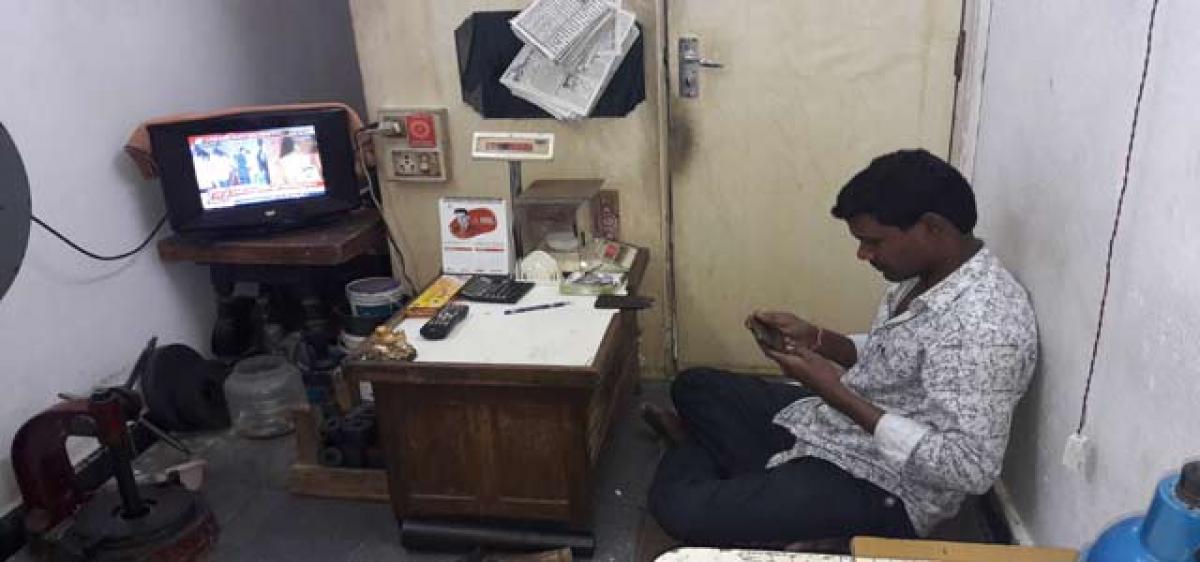Live
- Speed up Veligonda project works, CPM urges govt
- 10 career opportunities with a public policy degree
- TG Medical Council cracks whip on fake doctors
- TTD takes up mammoth waste management exercise
- Celebrating the power of communication
- Standing at work can actually be detrimental to BP
- Adani US bribery case reaches SC
- Prez, PM to address special event to mark Constitution Day
- I owe every film of mine to Vijay Sethupathi: Eashvar Karthic
- Achoo! City faces spike in flu, cold, cough cases
Just In

Exactly after one month of the demonetisation announcement by Prime Minister Narendra Modi on November 8, there seems not much change at ground level in terms of ease of cash flow and ease of doing the transactions.
Warangal: Exactly after one month of the demonetisation announcement by Prime Minister Narendra Modi on November 8, there seems not much change at ground level in terms of ease of cash flow and ease of doing the transactions.
The shutters of majority of 215 ATMs of different banks are still closed while those opened display boards saying ‘no cash’ and the public are still forced to wait in long queues before banks and ATMs to get cash.
Keeping aside the woes of the public, the business transactions in the district have taken a severe beating with the withdrawal of legal tender character of Rs 500 and Rs 1,000 currency followed by cash shortage.
According to Warangal Chambers of Commerce and Industry office bearers, the trade in the grain market has been at stand still state for the past one month. Normally more than Rs 100 crore worth business transactions used to take place at the market per month.
But following the demonetisation, there is loss of momentum in the business. More than 50 per cent of the usual business has been affected leaving the traders as well as the labourers in a lurch, stated the Chambers of Commerce president Katakam Pentaiah speaking to The Hans India on Thursday.
Farmers, small traders and labourers are the most affected section though big traders are capable of managing the side effects of the demonetisation to some extent. There is virtually no activity at the mills engaged in processing the agriculture produce, he added.
The same is the woes of the gold smiths and bullion merchants, who are facing double impact. The bullion market in the city which witnesses an average business of Rs 90 to Rs 100 crores per month is at stagnant state.
Both the withdrawal of higher denomination currency and proposed restrictions on gold purchases kept the buyers away from the market. The gold smiths are the worst hit, who deal with small quantity of gold and make ornaments on orders from customers. There are nearly 250 gold shops in the city besides nearly 10 corporate jewellery sellers in the city.
The business is down by more than 75 per cent during the last one month. Those running small shops have to spend nearly Rs 30,000 per month towards maintenance and without business it has become tough for them to meet the expenses, said Warangal Bullion Merchants Association secretary Gundu Srinivas.
The life of gold smiths is already in a troubled state and the demonetisation has made it worse, lamented the association president Katta Eashwar Prasad.
The Centre should have made arrangements to ensure cash flow in the market and it may not be wise to impose restrictions on gold, he felt.

© 2024 Hyderabad Media House Limited/The Hans India. All rights reserved. Powered by hocalwire.com







